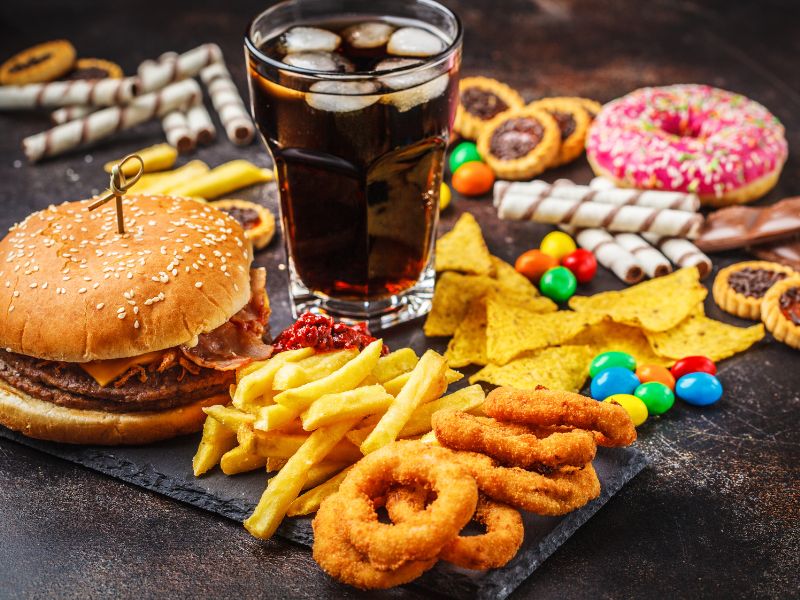Founded in 2014, Nava Health helps clients achieve lasting wellness with personalized health solutions. Here, you’ll discover nine foods that can disrupt your semaglutide diet and learn smarter choices for sustainable weight loss. With expert guidance from Nava Health, you can fuel your body for success and maximize your results. Even small changes can have a big impact on your journey.
A significant portion of U.S. adults are clinically obese, making obesity a major health concern linked to numerous chronic diseases and health issues.
Medications like Ozempic, Wegovy, and other semaglutide-based drugs were created to manage diabetes. They have gained popularity as a vital tool in weight loss due to their effectiveness in weight loss and blood sugar control.
Weight Loss Drugs – How They Work?
These weight loss medications, also known as GLP-1 medications, work by influencing hormones to reduce appetite and slow down digestion. However, their success also relies on a balanced and thoughtful diet.
At Nava Health, achieving and maintaining a healthy weight is critical to managing a longer, healthier life. Equally crucial to weight loss is learning how to eat mindfully.
Our NavaRX medically supervised weight loss program features semaglutide to assist in achieving weight loss goals and consistent guidance from certified nutrition counselors. Nava Health certified nutritionists specialize in teaching our clients how to eat with intention, fueling their bodies for optimal function, and eating foods that don’t cause inflammation.
To ensure your success, our certified nutrition counselors have compiled a list of 9 foods to avoid while on a Mounjaro, Ozempic, Wegovy, or a semaglutide-based diet.
9 Foods to Avoid on a Semaglutide-based Diet:
- Sugary Beverages – It’s crucial to cut out sugary beverages. Sodas, energy drinks, and sweetened fruit juices can cause spikes in blood sugar levels and undermine the effects of your medication. Opt for water, herbal teas, or beverages sweetened with non-caloric alternatives.
- Highly Processed Foods – Foods high in refined carbohydrates, such as white bread, pastries, and packaged snacks, should be avoided. These foods cause rapid increases in blood sugar levels and contribute to insulin resistance, counteracting the benefits of your medication.
- High-Fat Fast Foods – High-fat fast foods contribute to weight gain and can lead to digestive discomfort due to the slowed digestion caused by semaglutide-based medications. Greasy, fried foods can be hard on the digestive system and may result in nausea, bloating, or discomfort.
- Excessive Added Sugars – Look for hidden sugars in cereals, yogurt, and savory sauces. Excessive sugar consumption can disrupt blood sugar control and hinder weight loss efforts.
- Starchy Vegetables – While vegetables are generally healthy, it’s important to moderate starchy varieties like potatoes, corn, and peas. These can lead to higher carbohydrate intake, affecting blood sugar levels and interfering with the medication’s mechanisms.
- Full-fat Dairy – Whole milk and full-fat dairy products are high in saturated fats. They can be problematic for those aiming to lose weight and manage blood sugar. Opt for low-fat or non-dairy alternatives to ensure your diet remains heart-healthy and effective.
- High-Sodium Foods – Foods high in sodium, like processed meats, canned soups, and salty snacks, should be limited. High sodium intake can lead to water retention and affect blood pressure regulation.
- Artificial Sweeteners – While artificial sweeteners are low in calories, they can sometimes lead to cravings for sugary foods, undermining your weight loss efforts. Moreover, some people might experience digestive discomfort when consuming these sweeteners in combination with semaglutide-based medications.
- Large Portion Sizes – Lastly, be mindful of portion sizes. Overeating, even healthy foods, can lead to spikes in blood sugar and hinder weight loss progress. Practice portion control and listen to your body’s hunger cues.
Start Reaching Your Goals with Weight Loss Medication from Nava Health
A journey towards better health requires careful consideration of the foods we consume. Therefore, Ozempic, Wegovy, and other semaglutide-based medications can be powerful tools in managing weight and blood sugar, but their effectiveness is closely tied to dietary choices.
By avoiding many of the foods and beverages we’ve listed, you can optimize the benefits of your NavaRX medically supervised weight loss program and make substantial progress towards your health goals.
Always consult your healthcare provider and a certified nutrition counselor to tailor these recommendations to your needs and ensure your journey is safe and successful.
Have More Questions About Semaglutide? Get the Answers Here!
Does drinking alcohol affect semaglutide’s results?
Yes, alcohol can impact how your body responds to semaglutide. While occasional alcohol consumption may not significantly interfere, drinking in excess can lead to blood sugar fluctuations, increased appetite, and digestive discomfort.
Semaglutide slows digestion, so alcohol may stay in your system longer, increasing its effects. If you choose to drink, moderation is key, and it’s best to monitor how your body reacts.
How does semaglutide change hunger over time, and how should eating habits adjust?
Semaglutide works by mimicking natural hormones that regulate hunger and fullness. Over time, many people notice a significant reduction in appetite, which can help with portion control and mindful eating. However, it’s still essential to maintain balanced meals with enough nutrients.
Eating habits should shift toward smaller, nutrient-dense meals that prioritize lean protein, fiber, and healthy fats. Avoid skipping meals, as this can lead to energy crashes or nutrient deficiencies.
What healthy foods help semaglutide work better?
A well-balanced diet enhances semaglutide’s effects. Focus on lean protein sources like chicken, fish, tofu, and legumes to maintain muscle while losing weight. Healthy fats from avocados, nuts, seeds, and olive oil support satiety and brain function.
Fiber-rich foods such as leafy greens, berries, and whole grains promote digestion and help regulate blood sugar levels. Hydration is also important. Drinking plenty of water can support digestion and reduce common side effects like nausea. Choosing the right semaglutide food can help maximize your weight loss journey and keep you feeling your best.
What types of exercise work best with semaglutide for weight loss?
A combination of strength training and cardiovascular exercise works best. Strength training preserves muscle mass and supports metabolism, while cardio, such as brisk walking, swimming, or cycling, helps burn calories and improve heart health. Low-impact activities like yoga or Pilates can also enhance flexibility and support overall well-being. Since semaglutide can reduce appetite, it’s important to fuel workouts with adequate nutrients to prevent fatigue.
What vitamins and nutrients are most important on a semaglutide diet?
Because semaglutide can slow digestion, prioritizing nutrient-dense foods is essential. Key nutrients to focus on include:
- Protein – Supports muscle maintenance and energy levels.
- Fiber – Aids digestion and blood sugar regulation.
- Magnesium & Potassium – Found in leafy greens and bananas, these minerals support heart and muscle function.
- B Vitamins – Help with energy production and metabolism.
- Healthy Fats – Provide long-lasting energy and support brain function. If you struggle to get these nutrients from food alone, a high-quality multivitamin may be beneficial.
Are there any food allergies or intolerances to watch out for while using semaglutide?
Semaglutide itself is not known to trigger allergies, but its effects on digestion may make certain food intolerances more noticeable. Dairy, high-fat fried foods, and excessive added sugar can cause discomfort for some users. If you have sensitivities to gluten, artificial sweeteners, or processed foods, you may also find that your body responds more strongly while on semaglutide. Paying attention to how different foods affect you and adjusting accordingly can help improve your experience.



